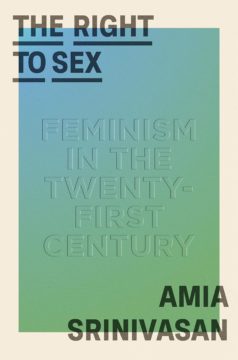Maggie Doherty at The Nation:
 “Does Anyone Have the Right to Sex?” was a shrewd yet compassionate essay, marked by rigorous thinking as well as the hope that we might make room for desires that don’t follow patriarchy’s scripts, without blaming people for desiring what they’ve been told to want. Srinivasan gestured in the essay toward a new feminist perspective, one that would draw on the work of the second-wave feminists of the 1960s and ’70s, who took questions of sexual desire seriously, without replicating some of their blind spots concerning race and class. Such a perspective would also preserve aspects of more recent feminist thinking—an emphasis on individual freedom, an awareness of the ways different forms of oppression intersect—without suggesting that desire is inherently good or just. Her aim was not to legislate anyone’s desires—that would be authoritarian—but rather to encourage readers to question their sexual preferences, to see their own desires as a starting point for inquiry rather than its end. There is no right to sex, she wrote, but there may be “a duty to transfigure, as best we can, our desires” so that they better align with our political goals
“Does Anyone Have the Right to Sex?” was a shrewd yet compassionate essay, marked by rigorous thinking as well as the hope that we might make room for desires that don’t follow patriarchy’s scripts, without blaming people for desiring what they’ve been told to want. Srinivasan gestured in the essay toward a new feminist perspective, one that would draw on the work of the second-wave feminists of the 1960s and ’70s, who took questions of sexual desire seriously, without replicating some of their blind spots concerning race and class. Such a perspective would also preserve aspects of more recent feminist thinking—an emphasis on individual freedom, an awareness of the ways different forms of oppression intersect—without suggesting that desire is inherently good or just. Her aim was not to legislate anyone’s desires—that would be authoritarian—but rather to encourage readers to question their sexual preferences, to see their own desires as a starting point for inquiry rather than its end. There is no right to sex, she wrote, but there may be “a duty to transfigure, as best we can, our desires” so that they better align with our political goals
more here.
